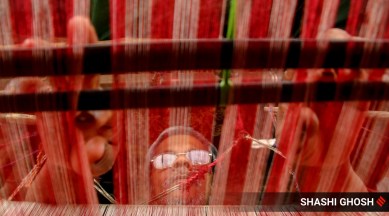📣 For more lifestyle news, click here to join our WhatsApp Channel and also follow us on Instagram
Lone weaver acts as torch bearer of the dying art of towel-weaving in West Bengal village
Once home to hundreds of weavers, the village of Amtala today has a solitary weaver, who sits alone in a loom all day and weaves towels.

In a village named Amtala at West Bengal’s Basirhat, a typical summer afternoon is characterised by scorching heat, deserted streets, and the occasional call of cuckoos, which complements the sound of a lone loom that comes from a distance. 61-year-old Parimal Nath is the only soul who sits in this loom, weaving — wait for it — towels.
As strange and non-dramatic as it sounds, there was a time when the sound from the looms weaving these towels would roar throughout the area. With time, however, these looms and the weavers in them started fading away, for they started switching to different professions. More importantly, the use of hand-woven cotton towels has become a thing of the past.
Unable to keep pace with time, this weaving industry is about to disappear due to lack of raw materials and financial resources. People involved with this industry are incurring losses for years. At present, due to high prices of raw materials and low selling price, there is no profit whatsoever in the handicraft industry.
Towel, called ‘gamchha‘ in Bengali is believed to be derived from the phrase ‘ga mochha’, or wiping your body after taking a bath. The age-old relationship of this fabric with the Bengali culture has deep roots. The usage of towel is integral to almost every Bengali ceremony; alas, it is the towel makers who live in darkness.
Parimal Nath is the only weaver in the whole of Amtala, who has retained the profession of his forefathers. “I have no desire to do this work. I have to do it under compulsion as I am too old to do any other heavy work at this age,” Nath said. “It is the only work I know which enables me to earn my meals,” he added.
According to him, the solitary support he receives from Pradeep Nath of the Basirhat Peace in Harmony Society helps him to sell a handful of hand-woven towels in the market. “It (the industry) does not get any support from the government. No one in the next generation should have to enter this profession,” Nath said.
Parimal Nath has been weaving towels for more than 40 years now. He can make four towels in a day. However, the advent of mechanical looms see 20 to 30 towels being woven in the blink of an eye, which serves as the perfect narrative for the demise of the hand-woven towel industry.
Basirhat Peace in Harmony Society’s Pradeep Nath was quoted saying, “The condition of weavers in Bengal is very poor. Once, Basirhat towels were valued all over the country. But now there are no weavers left.” He tries reaching out to the local markets for selling these hand-woven towels, and hands over the entire income to the artists.
Besides Amtala, hand-woven towels are also made in Devog, Diara, Soladana, Matia, Raghunathpur, Begumpur, Jayanagar, Piara, Katiyahat, and Barabankra villages of West Bengal.
📣 For more lifestyle news, follow us on Instagram | Twitter | Facebook and don’t miss out on the latest updates!
📣 For more lifestyle news, click here to join our WhatsApp Channel and also follow us on Instagram